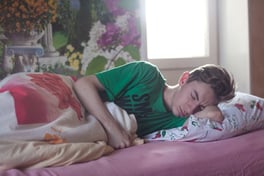Blog
- snoring (27)
- apnoea (20)
- sleep study (10)
- apnea (9)
- CPAP (7)
- Sleep studies (7)
- weight gain (6)
- sleep deprivation (5)
- sleep disorders (5)
- surgery for apnoea (5)
- diabetes (4)
- sleep apnoea (4)
- OAT (3)
- OSA (3)
- Pregnancy (3)
- Snore (3)
- children (3)
- heart disease (3)
- hypertension (3)
- in home sleep studies (3)
- obesity (3)
- polysomnogram (3)
- surgery for apnea (3)
- ADHD (2)
- Alzheimers (2)
- CPAP treatment (2)
- Gladstone CPAP (2)
- PSG (2)
- UPPP (2)
- apnea pregnancy (2)
- apnoea pregnancy (2)
- apnoea surgery (2)
- blood pressure (2)
- cognitive impairment (2)
- cpap supplies brisbane (2)
- cpap therapy (2)
- dementia (2)
- dental treatment for apnoea (2)
- dental treatment for snoring (2)
- diabetic peripheral neuropathy (2)
- driving (2)
- holiday (2)
- in home sleep study (2)
- kids (2)
- menopause (2)
- obstructive sleep apnoea (2)
- oral appliance therapy (2)
- sleep (2)
- sleep apnoea and weight (2)
- sleep apnoea study (2)
- sleep apnoea women (2)
- sleep clinics (2)
- sleep disordered breathing (2)
- sleeping tips (2)
- type 2 diabetes (2)
- Apnea Winter (1)
- Apnoea Winter (1)
- Apnoea and heart disease (1)
- Brisbane sleep study (1)
- CPAP Supplies (1)
- CPAP effectiveness (1)
- CPAP success rate (1)
- Christmas (1)
- Coal Board Medical (1)
- Coal Board Medicals (1)
- Depression (1)
- Emerald sleep clinic (1)
- Festive Season (1)
- Frequent Urination (1)
- Gladstone sleep study (1)
- Gladtone sleep studies (1)
- IQ (1)
- Nocturia (1)
- Nocturia Causes (1)
- OSA and obesity (1)
- Obstructive Sleep Apnoea and Cancer (1)
- Patient feedback on CPAP (1)
- SDB (1)
- Sleep Apnoea Treatment Leads To Cost Savings (1)
- Sleep and Depression (1)
- Sleep and pain (1)
- Sleep-related Breathing Disorder treatment (1)
- Sleeping on a plane (1)
- UARS (1)
- Upper Airway Resistance Syndrome (1)
- accupressure (1)
- accupressure treatment for snoring (1)
- alarm (1)
- alzheimers disease (1)
- anti snoring (1)
- apnea and cancer (1)
- apnea cognitive impairment (1)
- apnea dementia (1)
- apnea depression (1)
- apnea diabetes obesity cancer (1)
- apnea surgery (1)
- apnea treatment (1)
- apnoea cognitive impairment (1)
- apnoea dementia (1)
- apnoea depression (1)
- apnoea diabetes obesity cancer (1)
- apnoea diagnosis regional qld (1)
- apnoea diagnosis regional queensland (1)
- apnoea government funding (1)
- apnoea in children (1)
- apnoea in women (1)
- apnoea treatment (1)
- apnoea treatment regional qld (1)
- apnoea treatment regional queensland (1)
- bad sleeping habits (1)
- belly fat (1)
- benefits of home sleep study (1)
- best treatment (1)
- best treatment for apnoea (1)
- best treatment for snoring (1)
- blue light (1)
- bmi (1)
- brain (1)
- brain activity while sleeping (1)
- brain damage (1)
- breast cancer (1)
- brisbane cpap (1)
- brisbane cpap supplies (1)
- brisbane home based sleep study (1)
- can't sleep (1)
- cancer (1)
- cancer and apnea (1)
- cardio metabolic disease (1)
- catch a cold (1)
- childhood apnoea (1)
- children snoring (1)
- cleaning cpap machine (1)
- cold (1)
- compression bandages (1)
- consequences of snoring (1)
- cpap 2018 (1)
- cpap and sexual function (1)
- cpap brisbane (1)
- cpap cleaning (1)
- cpap diabetes sight (1)
- cpap diabetic retinopathy (1)
- cpap diabetic sight (1)
- cpap gladstone (1)
- cpap machine (1)
- cpap mask (1)
- cpap masks (1)
- cpap problems and solution (1)
- cpap risks (1)
- cpap supplies gladstone (1)
- cpap supplies qld (1)
- cpap supplies queensland (1)
- cpap treatment forever (1)
- cpap tubing (1)
- customer feedback (1)
- danger (1)
- diagnostic sleep study (1)
- dissatisfaction with UPPP (1)
- do I need a sleep study (1)
- driver fatigue queensland (1)
- effects of oversleeping (1)
- effects of sleep disorders on teenagers and childr (1)
- employment (1)
- exercise (1)
- exercise helps snoring (1)
- facebook apnoea (1)
- facebook snoring (1)
- fail (1)
- female apnoea (1)
- female sleep apnea (1)
- female sleep apnoea (1)
- female snoring (1)
- fertility (1)
- funding apnoea research (1)
- gender difference (1)
- genes (1)
- genetics (1)
- getting a sleep study in Brisbane (1)
- gladstone cpap supplies (1)
- gladstone home based sleep study (1)
- guided sleep meditation (1)
- health facts (1)
- help me sleep (1)
- hereditary (1)
- hidden epidemic (1)
- high blood pressure (1)
- hitting snooze (1)
- home based preferred (1)
- home based recommended (1)
- home based sleep study brisbane (1)
- home based sleep study gladstone (1)
- home sleep study (1)
- how to correct sleep disorders (1)
- how to fall asleep faster (1)
- how to stay awake (1)
- humidifier (1)
- impact of snoring (1)
- impaired judgement (1)
- insomnia (1)
- insomnia causes (1)
- kid sleeping tips (1)
- lack of sleep (1)
- loud snoring (1)
- memory (1)
- misdiagnosis (1)
- muscle pain (1)
- myths (1)
- natural solution (1)
- neck circumference (1)
- neck size (1)
- new year (1)
- obesity and sleep (1)
- obstructive sleep apnea (1)
- oh&s (1)
- overindulgence (1)
- oversleeping (1)
- oversleeping side effects (1)
- pinkie ring (1)
- poor sleep (1)
- preeclampsia (1)
- prevalence (1)
- problems with dental treatments for sleep disorder (1)
- problems with oat (1)
- psychology (1)
- queensland regional sleep clinic (1)
- queensland regional sleep clinics (1)
- queensland sleep studies (1)
- recover (1)
- regional sleep clinic (1)
- regional sleep clinics (1)
- regional sleep studies (1)
- relationships (1)
- research (1)
- resolution (1)
- separate rooms (1)
- severe sleep apnoea (1)
- sex (1)
- side effects of snoring (1)
- skipping cpap (1)
- sleep affects learning (1)
- sleep and cancer (1)
- sleep and obesity (1)
- sleep apnea (1)
- sleep apnea and alzheimer (1)
- sleep apnea and health (1)
- sleep apnea and ischemic heart disease (1)
- sleep apnea and stroke (1)
- sleep apnea cancer (1)
- sleep apnea causes (1)
- sleep apnea clinic CBD brisbane (1)
- sleep apnea prevention (1)
- sleep apnea studies (1)
- sleep apnea study (1)
- sleep apnea symptoms (1)
- sleep apnea teenagers (1)
- sleep apnea what is it (1)
- sleep apnea women (1)
- sleep apnoea and ischaemic heart disease (1)
- sleep apnoea and stroke (1)
- sleep apnoea and weight gain (1)
- sleep apnoea and weight loss (1)
- sleep apnoea brain damage (1)
- sleep apnoea cancer (1)
- sleep apnoea female (1)
- sleep apnoea studies (1)
- sleep apnoea symptoms (1)
- sleep apnoea teenagers (1)
- sleep apnoea treatment (1)
- sleep clinics gladstone (1)
- sleep depression (1)
- sleep deprived (1)
- sleep disorder (1)
- sleep disorder signs (1)
- sleep disorder symptoms (1)
- sleep drunkenness (1)
- sleep duration (1)
- sleep meditation (1)
- sleep myth (1)
- sleep paralysis (1)
- sleep problem (1)
- sleep studies bariatric surgery (1)
- sleep study Brisbane (1)
- sleep tracker watch (1)
- sleep watch (1)
- sleeping habits (1)
- sleepless (1)
- sleepstyle (1)
- smartwatch (1)
- smartwatch sleep (1)
- smoking (1)
- snooze (1)
- snooze button (1)
- snooze health effects (1)
- snore cure (1)
- snorer (1)
- snoring cure (1)
- snoring cures (1)
- snoring depression (1)
- snoring facts (1)
- snoring pregnancy (1)
- snoring problem (1)
- snoring problems (1)
- snoring solution (1)
- snoring statistics (1)
- snoring tips (1)
- socks (1)
- stigma (1)
- stockings (1)
- stop snoring (1)
- stress (1)
- stroke (1)
- success (1)
- success rate of cpap machines (1)
- surgical treatment apnoea (1)
- surgical treatment for sleep apnoea (1)
- surviving stress (1)
- symptoms of sleep apnea (1)
- symptoms of sleep apnoea (1)
- technology (1)
- teenage sleep disorders (1)
- teenager (1)
- testimonial (1)
- tips on snoring (1)
- travelling (1)
- treatment for apnea (1)
- treatment for apnoea (1)
- truck driver sleep (1)
- truck drivers (1)
- truck drivers apnea (1)
- truck driving (1)
- use cpap with a cold (1)
- using cpap (1)
- weight (1)
- what happens when you sleep (1)
- what is sleep apnea (1)
- why do we sleep (1)
- women (1)
- women apnoea (1)
- women sleep apnea (1)
- women sleep apnoea (1)
- women snoring (1)
- work (1)
Why and How Your Genes Could Be Affecting Your Sleep
Not surprisingly, scientists have been working hard to solve the mysteries of sleep for a long time. There are countless sleeping disorders including narcolepsy, sleep apnea, insomnia, snoring... the list goes on. But what you might not know is that your genes may be the reason why you’re having trouble sleeping at night.
Here are a few studies that show how genes may affect your sleeping problems:
1. Early Bird or Night Owl?
A study led by Alina Patke of the laboratory of genetics at Rockefeller University found  that being an early bird or a night owl can actually be linked to a gene mutation. It can cause your circadian or your internal body clock to run slowly resulting in either staying up really late at night or rising early every single day. And it's because of this that you may be losing more than two hours of sleep every night.
that being an early bird or a night owl can actually be linked to a gene mutation. It can cause your circadian or your internal body clock to run slowly resulting in either staying up really late at night or rising early every single day. And it's because of this that you may be losing more than two hours of sleep every night.
One of the most common types of circadian rhythm sleep disorder is Delayed Sleep Phase Disorder (DSPD). This disorder affects about 10% of the world’s population. You may suffer from DSPD if you’re experiencing the following symptoms:
• You are unable to fall asleep between 2 am and 6 am,
• You sleep longer during the daytime, or
• You have long afternoon naps.
 2. The FABP7 Gene
2. The FABP7 Gene
Another study where genes may be affecting sleep is led by Jason Gerstner, Assistant Research Professor at Washington State University’s Elson S. Floyd College of Medicine. Mr. Gerstner and his team tested the gene FABP7. They found that mice with a knocked out FABP7 gene slept more irregularly compared to mice with the gene intact.
Jason and his team then looked at data from a seven-day sleep study from 300 Japanese people. 29 of them had a variant of the gene responsible for the production of FABP7. Similar to the mice, they also experienced a series of waking events during the night.
3. Fruit Flies for Genes Study
In another study using naturally bred fruit flies, Susan Harbison, Ph.D., an investigator in the Laboratory of Systems  Genetics at the National Heart, Lung and Blood Institute identified differences between a group of genes. And, those differences explain why some people need less sleep while others need a lot more.
Genetics at the National Heart, Lung and Blood Institute identified differences between a group of genes. And, those differences explain why some people need less sleep while others need a lot more.
To produce a group of long sleepers (sleeping 18 hours a day) and short sleepers (sleeping 3 hours a day), Ms. Harbison and her team artificially bred 13 generations of wild fruit flies. They then studied the flies and discovered new proof of how genes and sleep duration are linked to a wide variety of biological processes.
These 3 studies show genes have a big impact on sleep. However, there are still far more discoveries to make about the mysteries of sleep.
